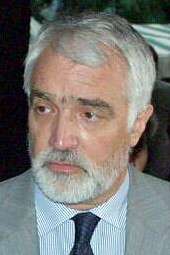G17 Plus
G17 Plus (G17+), was a liberal-conservative[1] political party in Serbia that existed from 2002 until 2013 when it merged into the United Regions of Serbia (URS).
G17 Plus Г17 плус | |
|---|---|
 | |
| President | Miroljub Labus (2002 - 2006) Mlađan Dinkić (2006 - 2013) |
| Founder | Miroljub Labus |
| Founded | 15 December 2002 |
| Dissolved | 21 April 2013 |
| Merged into | United Regions of Serbia |
| Ideology | Liberal conservatism Economic liberalism Pro-Europeanism |
| Political position | Centre-right |
| Colours | Blue and Grey |
Founded as a non-governmental organization dealing with economic issues, in 2002 it transformed into a political party that became part of several ruling coalition governments in Serbia throughout the 2000s and early 2010s.
Foundation
G17 Plus was founded in 1997 as a non-governmental organization (NGO) in Serbia, then a federal unit within FR Yugoslavia. The organization consisting of economic experts enjoyed financial support of the United States through the National Endowment for Democracy (NED).[2] It was registered as a political party on 15 December 2002, with Miroljub Labus as its first president.
At its first electoral showing at the 2003 parliamentary elections, G17 Plus received 11.5% of the popular vote and 34 seats in the National Assembly.
In March 2004, G17+ formed a coalition government with the Democratic Party of Serbia (DSS), the Serbian Renewal Movement (SPO) and New Serbia (NS). In May 2006 Miroljub Labus resigned as party leader and was replaced by Mlađan Dinkić. On October 1, 2006, the party quit the governing coalition over its failure to find and extradite ICTY fugitive Ratko Mladić.
In the 2007 elections, the party received 6.82% of the popular vote and 19 seats in the parliament.
G17+ received a single seat in the Community Assembly of Kosovo and Metohija.[3]
In 2010, G17 Plus founded the United Regions of Serbia (URS), a coalition of political parties and groups emphasizing decentralization and regional development of Serbia.[4] After a few years functioning as the centerpiece of the coalition, in April 2013 G17 Plus fully merged with URS, transforming it into a political party.
Presidents of the G17 Plus (2002–2013)
| # | President | Born–Died | Term start | Term end | |
|---|---|---|---|---|---|
| 1 | Miroljub Labus |  | 1947– | 15 December 2002 | 16 May 2006 |
| 2 | Mlađan Dinkić |  | 1964– | 16 May 2006 | 21 April 2013 |
Electoral results
| Election | # of votes | % of vote | # of seats | +/- | Coalition | Status |
|---|---|---|---|---|---|---|
| 2003 | 438,422 | 11.46% | 31 / 250 |
with SDP | government 2004–2006 | |
| opposition 2006–2007 | ||||||
| 2007 | 275,041 | 6.82% | 19 / 250 |
government | ||
| 2008 | 1,590,200 | 38.42% | 24 / 250 |
ZES | government | |
| 2012 | 215,666 | 5.51% | 10 / 250 |
URS | government 2012–2013 | |
| opposition 2013–2014 |
Presidential elections
| Election year | # | Candidate | 1st round votes | % | 2nd round votes | % | Notes |
|---|---|---|---|---|---|---|---|
| 2002 | 2nd | Miroljub Labus | 995,200 | 27.96 | 1,516,693 | 31.62 | Election declared invalid due to low turnout |
| 2003 | |||||||
| 2004 | Dragan Maršićanin | 414,971 | 13.31 | — | — | Government Coalition | |
| 2008 | Boris Tadić | 1,457,030 | 35.39 | 2,304,467 | 50.31 | For a European Serbia | |
| 2012 | Zoran Stanković | 257,054 | 6.58% | — | — | United Regions of Serbia | |
Positions held
Major positions held by G17 Plus members:
| President of the National Assembly of Serbia | Years |
|---|---|
| Predrag Marković | 2004–2006 |
| Governor of the National Bank of Yugoslavia / Serbia | Years |
| Mlađan Dinkić | 2000–2003 |
References
- Elisabeth Bakke (2010). "Central and East European party systems since 1989". Central and Southeast European Politics since 1989. Cambridge University Press. pp. 78, 80. ISBN 978-1-139-48750-4.
- "Hearing of the Commission on Security & Cooperation in Europe". National Endowment for Democracy. 1998-12-10. Archived from the original on March 30, 2006. Retrieved 2009-04-01.
- "Kosovo Serbs convene parliament; Pristina, international authorities object". Southeast European Times. 2008-06-30. Retrieved 2008-07-01.
- Osnovani Ujedinjeni regioni Srbije Archived 2012-03-06 at the Wayback Machine (in Serbian)